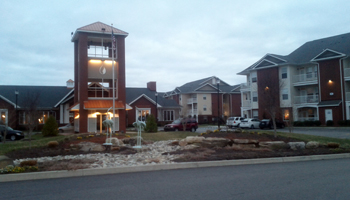
In a battle between apartment owners and hotel owners over thousands of temporary Petersburg tenants, one side is calling in the heavy artillery: lobbyists.
At issue is a recent U.S. Army policy change that requires soldiers temporarily assigned to Fort Lee to stay in hotels.
Landlords around Fort Lee say they were unfairly blocked from a big piece of lucrative business.
“This is putting an incredible financial strain on the business,” said Ivan Jecklin, who runs the Addison Crater Woods apartments for Weinstein Properties. “The Army is taking this slow, but we need them to act now, not six or eight months from now.”
Jecklin said he’s losing about $250,000 a month in rental income on about 200 apartments that are no longer being used by visiting soldiers.
Up for grabs is the $1 million the military spends each week to house about 2,000 temporary staff members near Fort Lee, although that figure will drop by half once the base opens its own 1,000-unit hotel this year. The Army was paying a per diem of $77 a day per person to house them in furnished apartments and local hotels near the base.
In 2009, the Army signed a contract with area hotels that ends up costing $68 per day. But the Army was still paying the full $77 rate for hundreds of its soldiers living in apartments until four weeks ago when an Army policy change dictated that all temporary staff members would stay in the contracted hotels.
The Lodging Success Program, which is now the Army’s standard rental policy, requires those soldiers who could not be housed on-base to stay in off-base buildings with, among other things, video surveillance at all entrances and exits, daily housekeeping, free Internet and cable and — high up in the requirements — interior corridors for security purposes.
That ruled out virtually every apartment complex in the region, because almost all of them have exterior corridors. At least two were built within the past three years specifically to reap business from Fort Lee.
Soldiers from across the country come to the Army Logistics University at Fort Lee for weeks to months at a time to study everything from cooking to accounting. As the base expanded over the past few years, ballooning to a population of 47,000 from 32,000, apartment developers built new complexes.
“It would be fine to say that the other program saves the Army money, but apartments weren’t allowed to be a part of the bid process,” said Patrick McCloud, head of the Central Virginia Apartment Association. “We didn’t even know about a bid process, and that’s a problem.”
 A handful of apartment owners said they want the security procedures rewritten to allow exterior corridor apartments to compete for lodging business, and they point to the more permanent staff members that live in their buildings. (There are different regulations for temporary duty soldiers in a location for 20 weeks or less).
A handful of apartment owners said they want the security procedures rewritten to allow exterior corridor apartments to compete for lodging business, and they point to the more permanent staff members that live in their buildings. (There are different regulations for temporary duty soldiers in a location for 20 weeks or less).
At a community meeting Monday night, Col. Rodney Edge, a commander at Fort Lee, said there would be no immediate change.
“We have to keep faith with the commitment we made to the contract with the Lodging Success Program hotels,” he said.
At the meeting, he said the Army saves $500,000 a month putting its soldiers in the 17 contracted hotels.
But apartment owners aren’t throwing up the white flag just yet.
They’ve banded together and hired retired Marine Col. Michael Shupp of the Washington lobbying firm Van Scoyoc Associates to pressure the military into an open bid process.
“We’re not asking for any kind of advantage here,” Shupp said. “We’re asking for an open competition. If the Army goes out and competes in the open market, it will bring down costs for them in the long run.”
Property managers in the Petersburg area say that the issue with Fort Lee affects the entire rental market.
Andrew Chisholm of Drucker and Falk property management, which manages apartments in the Petersburg area, said the battle with the Army is hurting everyone.
“We’ve got all these brand new units, and they are struggling,” Chisholm said. “They’re trying to lease these apartments up, so they are offering these deep discounts. And what that does is put downward pressure on other units in the area. … Petersburg is a scary place to be right now.”
McCloud, of the Central Virginia Apartment Association, said that losing the soldiers’ business opened up hundreds of units, which could scare off new development and discourage other developers from trying to attract soldiers to their units.
“The message this sends to developers is, ‘Stay the hell out of Petersburg, because you can’t trust the military,’” McCloud said.
In a battle between apartment owners and hotel owners over thousands of temporary Petersburg tenants, one side is calling in the heavy artillery: lobbyists.
At issue is a recent U.S. Army policy change that requires soldiers temporarily assigned to Fort Lee to stay in hotels.
Landlords around Fort Lee say they were unfairly blocked from a big piece of lucrative business.
“This is putting an incredible financial strain on the business,” said Ivan Jecklin, who runs the Addison Crater Woods apartments for Weinstein Properties. “The Army is taking this slow, but we need them to act now, not six or eight months from now.”
Jecklin said he’s losing about $250,000 a month in rental income on about 200 apartments that are no longer being used by visiting soldiers.
Up for grabs is the $1 million the military spends each week to house about 2,000 temporary staff members near Fort Lee, although that figure will drop by half once the base opens its own 1,000-unit hotel this year. The Army was paying a per diem of $77 a day per person to house them in furnished apartments and local hotels near the base.
In 2009, the Army signed a contract with area hotels that ends up costing $68 per day. But the Army was still paying the full $77 rate for hundreds of its soldiers living in apartments until four weeks ago when an Army policy change dictated that all temporary staff members would stay in the contracted hotels.
The Lodging Success Program, which is now the Army’s standard rental policy, requires those soldiers who could not be housed on-base to stay in off-base buildings with, among other things, video surveillance at all entrances and exits, daily housekeeping, free Internet and cable and — high up in the requirements — interior corridors for security purposes.
That ruled out virtually every apartment complex in the region, because almost all of them have exterior corridors. At least two were built within the past three years specifically to reap business from Fort Lee.
Soldiers from across the country come to the Army Logistics University at Fort Lee for weeks to months at a time to study everything from cooking to accounting. As the base expanded over the past few years, ballooning to a population of 47,000 from 32,000, apartment developers built new complexes.
“It would be fine to say that the other program saves the Army money, but apartments weren’t allowed to be a part of the bid process,” said Patrick McCloud, head of the Central Virginia Apartment Association. “We didn’t even know about a bid process, and that’s a problem.”
 A handful of apartment owners said they want the security procedures rewritten to allow exterior corridor apartments to compete for lodging business, and they point to the more permanent staff members that live in their buildings. (There are different regulations for temporary duty soldiers in a location for 20 weeks or less).
A handful of apartment owners said they want the security procedures rewritten to allow exterior corridor apartments to compete for lodging business, and they point to the more permanent staff members that live in their buildings. (There are different regulations for temporary duty soldiers in a location for 20 weeks or less).
At a community meeting Monday night, Col. Rodney Edge, a commander at Fort Lee, said there would be no immediate change.
“We have to keep faith with the commitment we made to the contract with the Lodging Success Program hotels,” he said.
At the meeting, he said the Army saves $500,000 a month putting its soldiers in the 17 contracted hotels.
But apartment owners aren’t throwing up the white flag just yet.
They’ve banded together and hired retired Marine Col. Michael Shupp of the Washington lobbying firm Van Scoyoc Associates to pressure the military into an open bid process.
“We’re not asking for any kind of advantage here,” Shupp said. “We’re asking for an open competition. If the Army goes out and competes in the open market, it will bring down costs for them in the long run.”
Property managers in the Petersburg area say that the issue with Fort Lee affects the entire rental market.
Andrew Chisholm of Drucker and Falk property management, which manages apartments in the Petersburg area, said the battle with the Army is hurting everyone.
“We’ve got all these brand new units, and they are struggling,” Chisholm said. “They’re trying to lease these apartments up, so they are offering these deep discounts. And what that does is put downward pressure on other units in the area. … Petersburg is a scary place to be right now.”
McCloud, of the Central Virginia Apartment Association, said that losing the soldiers’ business opened up hundreds of units, which could scare off new development and discourage other developers from trying to attract soldiers to their units.
“The message this sends to developers is, ‘Stay the hell out of Petersburg, because you can’t trust the military,’” McCloud said.



Historic buildings in Petersburg that can meet the stringent requirements of the military will escalate in value. The location and access to the base and to the interstate traffic is still too good to seriously hurt that rental market.
Bottom line here sounds like greed…..sounds like the apartments want to be an one stop shop for lodging not only for one day but several months. So if I am reading this article correctly the apartments are selling units at $77 per night versus their normal $800-$1,000 per month rates………..When did Petersburg VA become Manhattan????? I say the apartments owners are DEFRAUDING the Government!!!!!!!!!
please see link fraud in plain site
http://www.dabneyproperties.com/1200-acqua/fort-lee-lodging/rates/
For once, the US Govt is trying to save a few bucks (IE taxpayer dollars) by building and lodging their own employees (military and DOD civilians) in their own properties. The article states that the govt is saving $500,000 a month, so $6,000,000 a year at Fort Lee alone by housing their own staff. As a taxpayer, I don’t see any bad in this article!
It might be important to note that in response to Johnny’s comment the apartments would rent for $800 – $1000 per month without any furnishings. The $77 per night gets a service members a fully furnished apartment. Housewares and furniture. They are actually getting far more for their money in that arrangement than they are in a hotel arrangement.
I agree with Johnny & JD….sounds like greed plain and simple here folks. It is funny that the “group” has hired an attorney to fight this – what a load of _____. The attorney knows he will get PAID no matter the outcome. The military will not change their view on this. They cannot due to security reasons.